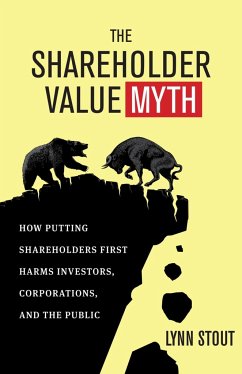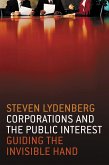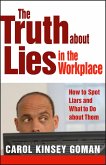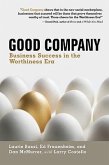Shareholder value is the dumbest idea in the world.
Jack Welch
Executives, investors, and the business press routinely chant the mantra that corporations are required to maximize shareholder value. In this pathbreaking book, renowned corporate expert Lynn Stout debunks the myth that corporate law mandates shareholder primacy.
Stout shows how shareholder value thinking endangers not only investors but the rest of us as well, leading managers to focus myopically on short-term earnings; discouraging investment and innovation; harming employees, customers, and communities; and causing companies to indulge in reckless, sociopathic, and irresponsible behaviors. And she looks at new models of corporate purpose that better serve the needs of investors, corporations, and society.
Jack Welch
Executives, investors, and the business press routinely chant the mantra that corporations are required to maximize shareholder value. In this pathbreaking book, renowned corporate expert Lynn Stout debunks the myth that corporate law mandates shareholder primacy.
Stout shows how shareholder value thinking endangers not only investors but the rest of us as well, leading managers to focus myopically on short-term earnings; discouraging investment and innovation; harming employees, customers, and communities; and causing companies to indulge in reckless, sociopathic, and irresponsible behaviors. And she looks at new models of corporate purpose that better serve the needs of investors, corporations, and society.
A must-read for managers, directors, and policymakers interested in getting America back in the business of creating real value for the long term.
Constance E. Bagley, Professor, Yale School of Management; President, Academy of Legal Studies in Business; and author of Managers and the Legal Environment and Winning Legally
A compelling call for radically changing the way business is done , The Shareholder Value Myth powerfully demonstrates both the dangers of the shareholder value rule and the falseness of its alleged legal necessity.
Joel Bakan, Professor, The University of British Columbia, and author of the book and film The Corporation
Lynn Stout has a keen mind, a sharp pen, and an unbending sense of fearlessness. Her book is a must-read for anyone interested in understanding the root causes of the current financial calamity.
Jack Willoughby, Senior Editor, Barron s
Lynn Stout offers a new vision of good corporate governance that serves investors, firms, and the American economy.
Judy Samuelson, Executive Director, Business and Society Program, The Aspen Institute
This book threatens to trigger an avalanche of new thinking about corporations. Written by one of the most respected theorists in corporate governance, it takes aim at the smug profit-only complacency found in business schools and boardrooms. Anyone who reads it will be forced to think and think again.
Thomas Donaldson, Mark O. Winkelman Professor, The Wharton School, University of Pennsylvania
The only antidote to prevailing bad theory is calm, careful, plainspoken, and relentless argumentation that peels away the distracting layers of abstract mumbo jumbo to expose the lunacy of the underlying theory for all to see. Lynn Stout does the world a great favor in exposing shareholder value theory for what it is: flawed and damaging theory. Comprehensive yet brief, profound yet enjoyable, this is a must-read for anyone who cares about the future of democratic capitalism.
Roger Martin, Dean, Rotman School of Management, University of Toronto, and author of Fixing the Game
It is widely believed that corporations exist solely to maximize profits. It is also widely believed that this corporate purpose is prescribed by law. Lynn Stout shows that these influential beliefs are both wrong and very likely destructive.
Ralph Gomory, Research Professor, New York University; President Emeritus, Alfred P. Sloan Foundation; and former Senior Vice President for Science and Technology, IBM Corporation
Professor Stout is a leader of a growing group of corporate executives, economists, lawyers, and thoughtful investors who have embraced the concept that corporations should, and indeed must, be managed in the interests of all their constituents. This book is a very readable explanation of the adverse impact that ignoring the interests of all constituents and short-termism have had on not just employees, customers, suppliers, communities, and the economy as a whole but the very shareholders themselves.
Martin Lipton, Senior Partner, Wachtell, Lipton, Rosen & Katz
Lynn Stout raises a critical question about American capitalism: what is the purpose of the public corporation? For too many years there has been an uncontested assertion that all that matters is creating shareholder wealth. This is an underlying cause of many of the ills facing American society, and this is therefore a critically important book!
Jay Lorsch, Louis Kirstein Professor of Human Relations, Harvard Business School, and author of Back to the Drawing Board (with Colin B. Carter) and Pawns or Potentates
Lynn Stout presents a thoroughly researched and articulated case against shareholder value exclusivity. It serves the grand purpose of illuminating the debate in the hope of finding a reasoned result.
Ira Millstein, Director, Columbia Law School and Columbia Business School Program on Global, Economic, and Regulatory Interdependence. and Theodore Nierenberg Adjunct Professor of Corporate Governance, Yale School of Management
Lynn Stout s engaging book deals a knockout blow to the mantra of shareholder value that has come to dominate corporate boardrooms in the last two decades. While she makes her case in a readable and entertaining way, her message is very serious: the obsession that the business community has with maximizing shareholder value is making US corporations weaker, not stronger.
Dr. Margaret M. Blair, Professor of Law, Milton R. Underwood Chair in Free Enterprise, Vanderbilt University Law School
Lynn Stout kicks another brick off of the mantle of short-termism, showing again why choosing to myopically focus on short-term value not only can destroy longer-term performance but also is legally inconsistent with leading corporate governance principles, incentives, and actions that aspire to more sustainable value creation over the long term and for all stakeholders, including shareholders.
Dean Krehmeyer, Executive Director, Business Roundtable Institute for Corporate Ethics
Constance E. Bagley, Professor, Yale School of Management; President, Academy of Legal Studies in Business; and author of Managers and the Legal Environment and Winning Legally
A compelling call for radically changing the way business is done , The Shareholder Value Myth powerfully demonstrates both the dangers of the shareholder value rule and the falseness of its alleged legal necessity.
Joel Bakan, Professor, The University of British Columbia, and author of the book and film The Corporation
Lynn Stout has a keen mind, a sharp pen, and an unbending sense of fearlessness. Her book is a must-read for anyone interested in understanding the root causes of the current financial calamity.
Jack Willoughby, Senior Editor, Barron s
Lynn Stout offers a new vision of good corporate governance that serves investors, firms, and the American economy.
Judy Samuelson, Executive Director, Business and Society Program, The Aspen Institute
This book threatens to trigger an avalanche of new thinking about corporations. Written by one of the most respected theorists in corporate governance, it takes aim at the smug profit-only complacency found in business schools and boardrooms. Anyone who reads it will be forced to think and think again.
Thomas Donaldson, Mark O. Winkelman Professor, The Wharton School, University of Pennsylvania
The only antidote to prevailing bad theory is calm, careful, plainspoken, and relentless argumentation that peels away the distracting layers of abstract mumbo jumbo to expose the lunacy of the underlying theory for all to see. Lynn Stout does the world a great favor in exposing shareholder value theory for what it is: flawed and damaging theory. Comprehensive yet brief, profound yet enjoyable, this is a must-read for anyone who cares about the future of democratic capitalism.
Roger Martin, Dean, Rotman School of Management, University of Toronto, and author of Fixing the Game
It is widely believed that corporations exist solely to maximize profits. It is also widely believed that this corporate purpose is prescribed by law. Lynn Stout shows that these influential beliefs are both wrong and very likely destructive.
Ralph Gomory, Research Professor, New York University; President Emeritus, Alfred P. Sloan Foundation; and former Senior Vice President for Science and Technology, IBM Corporation
Professor Stout is a leader of a growing group of corporate executives, economists, lawyers, and thoughtful investors who have embraced the concept that corporations should, and indeed must, be managed in the interests of all their constituents. This book is a very readable explanation of the adverse impact that ignoring the interests of all constituents and short-termism have had on not just employees, customers, suppliers, communities, and the economy as a whole but the very shareholders themselves.
Martin Lipton, Senior Partner, Wachtell, Lipton, Rosen & Katz
Lynn Stout raises a critical question about American capitalism: what is the purpose of the public corporation? For too many years there has been an uncontested assertion that all that matters is creating shareholder wealth. This is an underlying cause of many of the ills facing American society, and this is therefore a critically important book!
Jay Lorsch, Louis Kirstein Professor of Human Relations, Harvard Business School, and author of Back to the Drawing Board (with Colin B. Carter) and Pawns or Potentates
Lynn Stout presents a thoroughly researched and articulated case against shareholder value exclusivity. It serves the grand purpose of illuminating the debate in the hope of finding a reasoned result.
Ira Millstein, Director, Columbia Law School and Columbia Business School Program on Global, Economic, and Regulatory Interdependence. and Theodore Nierenberg Adjunct Professor of Corporate Governance, Yale School of Management
Lynn Stout s engaging book deals a knockout blow to the mantra of shareholder value that has come to dominate corporate boardrooms in the last two decades. While she makes her case in a readable and entertaining way, her message is very serious: the obsession that the business community has with maximizing shareholder value is making US corporations weaker, not stronger.
Dr. Margaret M. Blair, Professor of Law, Milton R. Underwood Chair in Free Enterprise, Vanderbilt University Law School
Lynn Stout kicks another brick off of the mantle of short-termism, showing again why choosing to myopically focus on short-term value not only can destroy longer-term performance but also is legally inconsistent with leading corporate governance principles, incentives, and actions that aspire to more sustainable value creation over the long term and for all stakeholders, including shareholders.
Dean Krehmeyer, Executive Director, Business Roundtable Institute for Corporate Ethics








